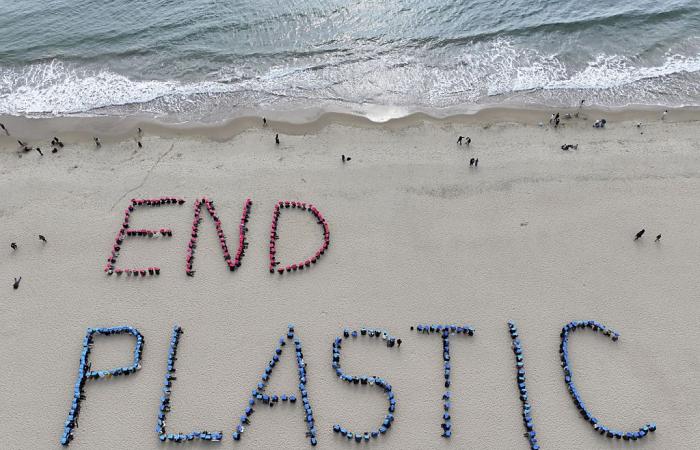The fifth and final round of negotiations on a global treaty against plastic pollution opened Monday in Busan, South Korea. This meeting takes place the day after the chaotic end in Baku of the COP29 on climate, the results of which were disappointing.
‘This conference is much more than the drafting of an international treaty. It is humanity that is mobilizing in the face of an existential threat. The decisions we make in the next seven days will shape history,’ the Ecuadorian diplomat who chairs the debates, Luis Vayas Valdivieso, said on Monday.
He recalled that the 178 countries participating in the negotiations have ’63 hours of work’ ahead of them to agree on thorny issues such as capping plastic production, the possible ban on toxic chemicals or even financing. measures which will be provided for by the treaty.
Plastic pollution is so widespread that it has even been detected in clouds, in the deepest ocean trenches and in virtually every part of the human body including the brain and breast milk.
Divergences
While everyone agrees on the seriousness of the problem, opinions differ radically on how to combat it. ‘There are real differences on several key elements,’ recognized Sunday Inger Andersen, head of the United Nations environment program. ‘I am convinced that we can get there, but everyone will have to put a little effort into it,’ she added.
“We must put an end to plastic pollution before plastic pollution puts an end to humanity,” added South Korean Environment Minister Kim Wan-sup on Monday, whose country is hosting the conference. , is the world’s fourth largest producer of plastics.
In 2019, the world produced around 460 million tonnes of plastic, a figure that has doubled since 2000, according to the Organization for Economic Co-operation and Development (OECD). And the quantity is likely to double again by 2040.
More than 90% of plastic is never recycled and more than 20 million tonnes end up in nature every year, often after just a few minutes of use. Plastic also accounts for 3% of global carbon emissions, mainly due to its production from fossil fuels.
Two opposing camps
In Busan, two camps oppose each other. First there is the ‘coalition of high ambitions’ (HAC) which brings together many African, European and Asian states. These countries want a treaty covering the entire ‘life cycle’ of plastics, from production to waste.
The HAC campaigns for binding global targets to reduce production and waste, and to impose changes in the design of plastics to facilitate their reuse or recycling. She warned of ‘special interests’ that could derail a deal.
In the opposing camp, other countries, mainly large oil producers like Russia and Saudi Arabia, would like the treaty to only concern waste management.
Quarrels from the opening
The arguments began as soon as the debates opened, with India, Russia and the Arab group demanding that any decision be adopted by consensus and not by majority.
These same divisions paralyzed the four previous rounds of negotiations, which resulted in a draft treaty of more than 70 pages that was totally abstruse and unworkable, by all accounts.
To try to resolve the situation, Mr. Vayas Valdivieso has drawn up an alternative project. More readable, the 17-page text emphasizes common areas, such as the need to promote reusable plastics. But it leaves aside the most controversial issues, to the great dismay of the most ambitious countries and environmental organizations.
/ATS






